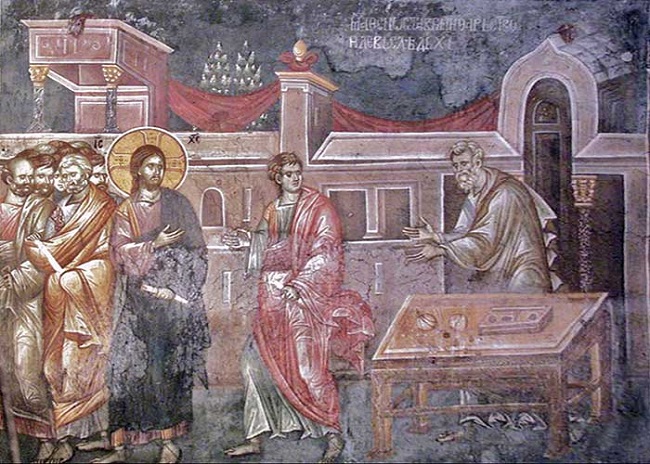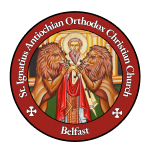Dear brothers and sisters,
This is weekly newsletter #26 of the St Ignatius Parish in Belfast.
Contents of this Newsletter:
- Message from Fr Dmitry
- News and Announcements
- Homily on last Sunday’s Gospel: Mercy, and Not Sacrifice
Message from Fr Dmitry
Dear brothers and sisters,
This coming week we celebrate one of the twelve great feasts of the Orthodox Church — the Entrance of the Theotokos into the Temple. We will reflect on the meaning of this feast during our Faith & Fellowship online meeting on Wednesday at 7:00 PM. Please see the News & Announcements section for details on how to join.
On Sunday, 23 November, there will be a Reader’s Service (a service without a priest) in church at 11:00 AM, followed by light fasting refreshments. I encourage everyone to make an effort to come and pray together with your brothers and sisters, to hear the reading of Scripture, and to share in the fellowship afterwards.
Finally, I remind you that we are now just over a week away from the visit of the wonderworking Kursk Root Icon of the Most Holy Theotokos to Belfast. The icon will be received and hosted by the parish of St John of Shanghai (ROCOR). A Service of Supplication will take place on Tuesday, 26 November, at 6:00 PM at St Mary’s Church, 824 Shore Road, Greencastle, BT36 7DG, Belfast. Everyone is warmly invited to attend. More details on the parish’s official Facebook page
News and Announcements:
- Weekly Online Faith & Fellowship Meetings on Wednesdays: Join us for our next regular weekly Zoom meeting on Wednesday, 19th of November, at 7:00 PM (UK time): https://ucl.zoom.us/j/97707660214 This week, we will pray Little Compline and discuss the Feast of the Entrance of the Most Holy Theotokos to the Temple.
- Parish Library is now open – I remind you that that our parish library is now open! The library offers a growing collection of Orthodox books on various subjects for both adults and children, which you are welcome to borrow and read. You can browse the catalogue online, check the borrowing terms, and even place an order for a book at: saintignatiusbelfast.org/library. Our librarians, Michael and Porphyrius, will be glad to assist you and can be contacted at library@saintignatiusbelfast.org.
Last Sunday’s Gospel Reading and Homily: Mercy, and Not Sacrifice
The reading from the Holy Gospel according to St Matthew (9:9-13):

At that time, as Jesus passed on, he saw a man called Matthew sitting at the tax office; and he said to him, “Follow me.” And he rose and followed him. And as he sat at table in the house, behold, many tax collectors and sinners came and sat down with Jesus and his disciples. And when the Pharisees saw this, they said to his disciples, “Why does your teacher eat with tax collectors and sinners?” But when he heard it, he said, “Those who are well have no need of a physician, but those who are sick. Go and learn what this means, ‘I desire mercy, and not sacrifice.’ For I came not to call the righteous, but sinners to repentance.
Homily: Mercy, and Not Sacrifice
In the name of the Father, and of the Son, and of the Holy Spirit. Amen.
Last Sunday, the 16th of November, we read in churches the Gospel account of how Christ called Matthew to apostleship. Matthew, who would be numbered among the Twelve Apostles and become the author of one of the four Gospels, was before his calling a tax collector.
Tax collectors were among the most hated people in Israel at that time. They were seen as collaborators, Jews who worked for the occupying Roman Empire, collecting taxes on its behalf. The Roman authorities also tolerated corruption, so tax collectors often enriched themselves by taking more than was required. In the eyes of their own people they were traitors, thieves, and sinners, ritually unclean. A righteous Jew would avoid any contact with them, and certainly would not share a meal.
Yet this is the man Christ calls. “Follow me,” He says, and Matthew immediately rises and follows.
This, of course, scandalised the Pharisees. Not only did Christ call Matthew, but Matthew then invited Him and other tax collectors to his house for a meal. Christ sat at table with sinners. The Pharisees questioned His disciples: “Why does your Teacher eat with tax collectors and sinners?”
Hearing this, Christ responds with the first of two profound phrases in this Gospel passage: “Those who are well have no need of a physician, but those who are sick.” The well, meaning the righteous, already know God and the ways of repentance. But the sick, meaning sinners, are the ones most in need of healing. That is why He came, to bring them back to life and to teach them the way of righteousness.
So we should not be surprised that the Church is not full of perfect people, but of those who are sick, each of us in our own way. We sin, we fail, we fall short. Yet we have come to the right place, to the hospital of the soul, the Church, where we meet the divine Physician, Christ Himself, who came to call sinners, all of us, to repentance.
There is also another phrase in this Gospel, just as important. Christ tells the Pharisees: “Go and learn what this means, ‘I desire mercy and not sacrifice.’” Here He quotes the prophet Hosea (Hosea 6:6), who adds, “I desire mercy and not sacrifice, and the knowledge of God more than burnt offerings.”
Christ is calling out the Pharisees for their superficial righteousness. If they truly knew God, they would understand that God is mercy and love. Because they do not show mercy, it means they have not really known God, and must still go and learn what this means.
And are we not sometimes like the Pharisees? We come to the Liturgy, but do we always come with understanding? We meet God in the Eucharist, yet if our hearts are not open to mercy, we risk turning the Liturgy into a mere ritual. The Eucharist is indeed our offering, a bloodless sacrifice of bread and wine in thanksgiving to God, which becomes the Body and Blood of Christ. But if we do not first show mercy, our offering is not pleasing to God.
We learn from this that mercy is not only a feeling of compassion but a way of life. To be merciful means to forgive when wronged, to speak kindly rather than judge, to help quietly rather than condemn loudly. It means to look at every person as someone whom Christ has come to heal and save. If we begin to see others in this way, then our prayer, our fasting, and our offering at the Liturgy become truly pleasing to God, for they will be joined with a heart that shows mercy.
First show mercy, then offer your sacrifice. Amen.
Yours in Christ,
Fr Dmitry
